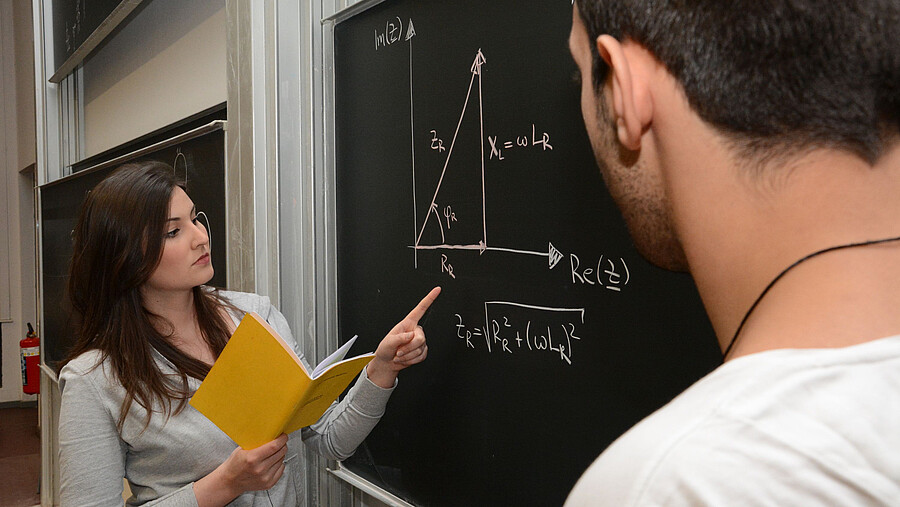Electrical Engineering and Information Technology
(Bachelor of Science)
Profile
German HZB: none
International application: German C1
Find out more
Pre-internship (recommended)
Stay abroad possible, but not obligatory.
Short Description
Electrical engineering is omnipresent - from the smart factory to intelligent energy systems, the regenerative generation of electrical energy, e-mobility to medical technology. Electrical engineering and information technology play a key role in everyday life, medicine and industry and make our lives safer, healthier, more environmentally conscious and more versatile.
At Leibniz University Hannover, the focus is on the research areas of biomedical engineering, digital society, energy, robotics and intelligent systems.
Course Content
- Track Automation and Robotics (formally Automation Technology)
- Track Machine Learning (formally Computer Engineering)
- Track Power and Mobility (formally Electric Power Engineering)
- Track Microelectronics
- Track Communications Engineering
The bachelor's degree in electrical engineering is divided into a foundation stage and an application stage and provides a broad, scientifically based education that is combined with practical skills. The four-semester foundation stage deals primarily with mathematics, mechanics and basic scientific and technical subjects. It also includes an 8-week internship. After studying the basics, students concentrate on one of the possible specializations in the application stage: automation and robotics, energy and mobility, communications engineering, microelectronics or machine learning.
In the two-semester application stage, students attend the core subjects control engineering I + II as well as application-oriented compulsory and elective courses of the chosen specialization. The degree programme also involves the Studium Generale, experimental lab work and project work. The application stage concludes with a Bachelor’s thesis.
| Kompetenzfeld/Semester | 1 | 2 | 3 | 4 | 5 | 6 | |
|---|---|---|---|---|---|---|---|
| Mathematik, natur- und ingenieurwissenschaftliche Grundlagen | Vorpraktikum |
|
|
| |||
| Informations- und Systemtechnik | Grundlagen digitaler Systeme |
| |||||
| Elektrotechnik | Grundlagen der Elektrotechnik: Gleich- und Wechselstromnetzwerke |
|
| Halbleiterelektronik / GruLaLa 3 | |||
| Vertiefungsrichtungen | Wahlpflichtfach (Wahl 4 aus 7):
|
|
| ||||
| Zusatz- und Schlüsselkompetenzen | Studieneinstiegsmodul: Ringvorlesung / Mathematische Methoden / Praxis elektrischer Methoden / Technisches Projekt |
| |||||
| Bachelorarbeit | Bachelorarbeit und Präsenation der Bachelorarbeit | ||||||
| Leistungspunkte | 30 | 30 | 32 | 29 | 29 | 30 |
Electrical engineering students should possess strong powers of imagination and abstraction. It is also important that they have a technical flair, an interest in mathematics and a logical way of thinking. Good foreign language skills are advantageous.
The programme involves eight weeks of basic internship, which prospective students are strongly recommended to complete before embarking on the degree programme. No specific time is set aside for completing this basic practical training during the degree programme.
Graduates work in R&D labs in virtually all branches of industry, for utility companies, software firms and services enterprises, as well as in the public sector, research institutes and educational institutions. They often start their careers in R&D, and increasingly take on management tasks at a later stage. The degree programme prepares students for independent work in research, development and production. It also qualifies them to work in technical sales and to assume executive positions in various corporate divisions.
- Electrical Engineering and Information Technology (Master of Science)
- Power Engineering (Master of Science)
- Geodesy and Geoinformatics, Specialisation in Navigation and Field Robotics (Master of Science)
- Nanotechnology (Master of Science)
- Water and Environment (distance learning) (Master of Science)
- Master’s Teacher Training Course for Technical Education for Single-subject Bachelor's Graduates (LBS-Sprint) (Master of Education)
- Quantum Engineering (Master of Science)
Under certain conditions, admission to the following Master''s programme is also possible. More detailed information can be found in the respective admission regulations. If you have any questions, please contact the course advice of the desired Master''s programme:
Admission Requirements
This degree programme is admission-free.
If you did not graduate from a German school nor have a German higher education entrance qualification (for example, the Abitur), a language certificate proving your knowledge of German is required for the application and enrollment.
Application Deadlines
01.06.-30.09. of the year for the winter semester
01.12.-31.03. of the year for the summer semester
- Requirements for applications from non-EU countries:
- VPD from uni-assist OR a passed assessment test (Feststellungsprüfung) of a preparatory foundation course (Studienkolleg)
- Applications for the Studienkolleg must be submitted by July 15th (winter semester) or January 15th (summer semester).
Electrical Engineering and Information Technology (B.Sc.) - Torben talks about his studies
Please note that activating the video will result in the transfer of data to the respective provider. Further information can be found in our privacy policy.
Play video
Do you have questions about studying? We are happy to help!

30167 Hannover

30167 Hannover











